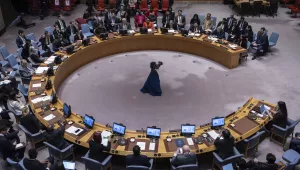BOSTON -- Watching US policy in the Middle East as I do these days from Boston, and seeing the deep and persistent tilt towards Israel, it is hard to see any breakthrough emerging from the US-concocted "proximity talks" to launch this week between Israel and the Palestinians. At the same time, it would be irresponsible simply to write off this effort as the latest example of that bizarre process that sees American romanticism or amateurism in mediating peace combine with strong American support for Israeli colonialism (settlements expansion), barbarism (the siege of Gaza that now results in stunting among Palestinian children), and recidivism (refusing to deal with the Goldstone Report on war crimes in the Gaza war).
There is much evidence against the United States being an impartial or decisive mediator. It includes the past quarter century or so of intense mediation that consistently failed to produce results, the last 17 years of direct but failed Palestinian-Israeli talks, long-standing American guarantees of Israeli military superiority over all its neighbors, and the last year of dashed hopes in the Barack Obama administration's quest to prod a fair peace, because the US backed down when Israel refused any serious freezing of its settler-colonialism. To drive the point home, Israel greeted the visiting US Vice President, Joseph Biden, Sunday with the in-your-face announcement of more settlement expansions, as it does regularly with senior American official visitors.
The apparent futility of expecting serious mediation by the United States is slightly countered, however, by the US' persistence in attempting serious mediation. Why? What does this mean? The Obama Bunch are led in this process by an able, wise and experienced mediator in George Mitchell. The question that remains unanswered, nearly 14 months after Obama-Mitchell and Co. launched this process, is whether the United States is engaged in serious mediation to achieve the full rights of Israelis and Palestinians; or, is it merely exploring creative new ways to translate Israel's power over occupied Palestinians, largely pacified Arabs, and terrorized and intimidated American politicians, into a distorted process that leads to an illusory and brittle agreement -- as happened in the Oslo process.
It is impossible to take the American government seriously as an impartial mediator when it refuses to come to terms with the most powerful single issue for the Arabs -- the expulsion and refugeehood of the Palestinians -- and refuses to deal with some critically important and powerful actors in the Arab region -- the armed Islamists such as Hamas and Hizbullah. If both the core issue and the critical players on the Arab side are simultaneously out of bounds for the United States, because Israel dictates this, how serious a process can we expect from "proximity talks" in American hands?
The contrasts between the United States and George Mitchell as mediator in Israel-Palestine and the same country and person moving to success in Northern Ireland years ago are striking, and quite devastating. In Northern Ireland, as Mitchell recounted in his writing after the fact, success required both sides and all parties to commit to several key elements: adopting democratic and non-violent conflict resolution principles, decommissioning their weapons simultaneously, submitting their decommissioning to independent verification, abiding by the outcome of a negotiated agreement, and renouncing the use of violence, intimidation or punishment to influence the talks. The United States and others involved in the mediation accepted into the negotiations all parties that accepted these core principles, which means the militants and ‘terrorists' on both sides became legitimate, credible and essential negotiators.
The specifics in Palestine/Israel are very different from Northern Ireland; the attributes of a credible and effective mediator are not. The mediator's credibility and role are critical here because the principals are hopelessly unable to end their conflict on their own. If proximity talks, or stand-on-your-head talks, or watch-me-dance-all-night talks that the United States suggests are to succeed, they must be crafted in a manner, and mediated by an actor, that in both cases affirm that peace happens when both parties see their legitimacy acknowledged, their core issues addressed, and their priority needs being met through peaceful means.
We are far from this point in Israel/Palestine. There is still absolutely no sign that the United States is prepared to address Palestinian refugeehood seriously as the key to ending this conflict, while there are many and repeated signs that the US places the security of Israel, and even Israeli Jewishness, as the starting and ending point for the negotiations.
So, given all these signs of obvious weakness and bias in the US position, why does Washington persist in playing this mediating role? The only practical benefit of the proximity talks that I can see for now is that they might clarify for us the motivation, principles and strategy of the US mediators, who will soon to be revealed as patient pragmatists, strong-armed roughnecks, delusional romantics, or the biggest con-men since Bernie Madoff.
Khouri, Rami. “The Benefit of Proximity Talks.” Agence Global, March 10, 2010




